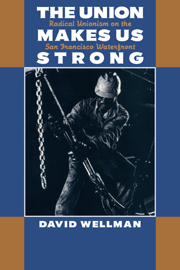Crossref Citations
This Book has been
cited by the following publications. This list is generated based on data provided by Crossref.
Wellman, David
1994.
Constituting ethnographic authority: The work process of field research, an ethnographic account.
Cultural Studies,
Vol. 8,
Issue. 3,
p.
569.
Weinhauer, Klaus
1997.
Labour Market, Work Mentality and Syndicalism: Dock Labour in the United States and Hamburg, 1900–1950s.
International Review of Social History,
Vol. 42,
Issue. 2,
p.
219.
Lüthje, Boy
and
Scherrer, Christoph
2001.
Race, Multiculturalism, and Labour Organizing in the United States: Lessons for Europe.
Capital & Class,
Vol. 25,
Issue. 1,
p.
141.
Stepan-Norris, Judith
and
Zeitlin, Maurice
2002.
Left Out.
Hall, Peter V.
2004.
“We’d Have to Sink the Ships”: Impact Studies and the 2002 West Coast Port Lockout.
Economic Development Quarterly,
Vol. 18,
Issue. 4,
p.
354.
Reinarman, Craig
2004.
Public health and human rights: the virtues of ambiguity.
International Journal of Drug Policy,
Vol. 15,
Issue. 4,
p.
239.
DIXON, MARC
2004.
STATUS DIVISIONS AND WORKER MOBILIZATION.
Sociological Spectrum,
Vol. 24,
Issue. 3,
p.
369.
Schiavone, Michael
2007.
Moody's Account of Social Movement Unionism: An Analysis.
Critical Sociology,
Vol. 33,
Issue. 1-2,
p.
279.
TURNBULL, PETER J.
and
WASS, VICTORIA J.
2007.
Defending Dock Workers—Globalization and Labor Relations in the World's Ports.
Industrial Relations: A Journal of Economy and Society,
Vol. 46,
Issue. 3,
p.
582.
FARRIS, M. THEODORE
2008.
Are You Prepared for a Devastating Port Strike in 2008?.
Transportation Journal,
Vol. 47,
Issue. 1,
p.
43.
FARRIS, M. THEODORE
2008.
Are You Prepared for a Devastating Port Strike in 2008?.
Transportation Journal,
Vol. 47,
Issue. 1,
p.
43.
Gentile, Antonina
and
Tarrow, Sidney
2009.
Charles Tilly, globalization, and labor’s citizen rights.
European Political Science Review,
Vol. 1,
Issue. 3,
p.
465.
Rudy, P
2009.
Culture of the Labor Movement and Work in the United States.
Sociology Compass,
Vol. 3,
Issue. 4,
p.
575.
Turnbull, Peter
2012.
The Blackwell Companion to Maritime Economics.
p.
517.
Cole, Peter
and
Limb, Peter
2017.
Hooks down! Anti-apartheid activism and solidarity among maritime unions in Australia and the United States.
Labor History,
Vol. 58,
Issue. 3,
p.
303.





